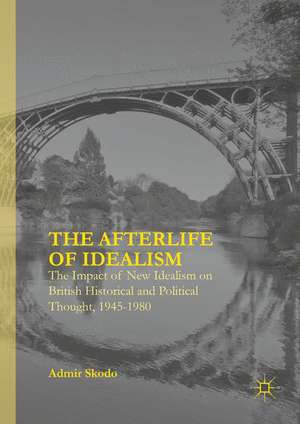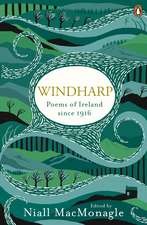The Afterlife of Idealism: The Impact of New Idealism on British Historical and Political Thought, 1945-1980
Autor Admir Skodoen Limba Engleză Hardback – 6 iun 2016
| Toate formatele și edițiile | Preț | Express |
|---|---|---|
| Paperback (1) | 386.22 lei 6-8 săpt. | |
| Springer International Publishing – 30 mai 2018 | 386.22 lei 6-8 săpt. | |
| Hardback (1) | 391.61 lei 6-8 săpt. | |
| Springer International Publishing – 6 iun 2016 | 391.61 lei 6-8 săpt. |
Preț: 391.61 lei
Nou
Puncte Express: 587
Preț estimativ în valută:
74.94€ • 77.95$ • 61.87£
74.94€ • 77.95$ • 61.87£
Carte tipărită la comandă
Livrare economică 14-28 aprilie
Preluare comenzi: 021 569.72.76
Specificații
ISBN-13: 9783319293844
ISBN-10: 3319293842
Pagini: 298
Ilustrații: VII, 301 p.
Dimensiuni: 148 x 210 x 23 mm
Greutate: 0.5 kg
Ediția:1st ed. 2016
Editura: Springer International Publishing
Colecția Palgrave Macmillan
Locul publicării:Cham, Switzerland
ISBN-10: 3319293842
Pagini: 298
Ilustrații: VII, 301 p.
Dimensiuni: 148 x 210 x 23 mm
Greutate: 0.5 kg
Ediția:1st ed. 2016
Editura: Springer International Publishing
Colecția Palgrave Macmillan
Locul publicării:Cham, Switzerland
Cuprins
Introduction.-Chapter 1. Revisionist Potential: Historical Thought from Absolute to New Idealism.- .Chapter 2. The Philosophical Moment in Postwar Historiography.-Chapter 3. Revisionist Whiggism: Revisions of the English Past from the Tudors to the Victorians.-Chapter 4.The Political Thought of Revisionism.-Conclusion.-Appendix: Short Biographies of Key New Idealists and Early Postwar British Historians.
Recenzii
“The Afterlife of Idealism is a rich history that covers a complex landscape of political theory, historical writing, and social criticism from early post-war Britain. … the book is for a wide range of readers, from intellectual historians to those interested in the history of philosophy and historiography.” (Julia Moses, European Journal of Philosophy, Vol. 26, 2018)
“The Afterlife of Idealism offers another perspective on British historiography in one of its most fecund phases. In Skodo’s book Carr’s What is History? is not the starting point of post-war historical reflection; post-war historians were already caught up in historical philosophising and philosophical history. After The Afterlife of Idealism, Elton, Clark, Laslett, et al. are far harder to pigeon hole, far more plural in their predilections than may be popularly imagined.” (Jamie Melrose, Rethinking History: The Journal of Theory and Practice, October, 2017)
Notă biografică
Admir Skodo is a researcher at Lund University, Sweden.
Textul de pe ultima copertă
This book examines the legacy of philosophical idealism in twentieth century British historical and political thought. It demonstrates that the absolute idealism of the nineteenth century was radically transformed by R.G. Collingwood, Michael Oakeshott, and Benedetto Croce. These new idealists developed a new philosophy of history with an emphasis on the study of human agency, and historicist humanism. This study unearths the impact of the new idealism on the thought of a group of prominent revisionist historians in the welfare state period, focusing on E.H. Carr, Isaiah Berlin, G.R. Elton, Peter Laslett, and George Kitson Clark. It shows that these historians used the new idealism to restate the nature of history and to revise modern English history against the backdrop of the intellectual, social and political problems of the welfare state period, thus making new idealist revisionism a key tradition in early postwar historiography.
Caracteristici
Examines how British historians used the new idealism to reshape the nature of history in the welfare state period Demonstrates how absolute idealism was radically transformed in twentieth century Britain Argues that the philosophical idealism of leading intellectuals had an unmistakable impact on the historical and political thought of leading British historians and public figures







